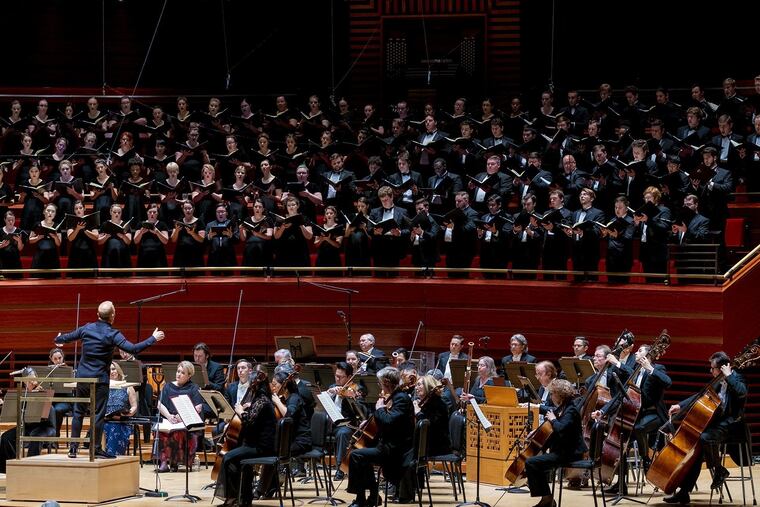Yannick’s first Philadelphia outing with Bach ‘Mass in b minor’ feels like a promising work in progress
Soloists Carolyn Sampson, Karen Cargill, Jonas Hacker, and Benjamin Appl were all standouts. Cargill’s “Agnus Dei” had immense emotional gravity that created the single best moments of the performance.

Bach’s Mass in B minor is music that reaches toward the cosmos — but is launched with a profusion of moving parts that challenges performers and listeners alike. All the right components were onstage Thursday for its first Philadelphia Orchestra performance since 1985, but often they carefully coexisted more than actually fusing.
Keep in mind that music director Yannick Nézet-Séguin was returning to the piece’s many singular demands after many years, and he seemed more concerned with the considerable mechanics of the piece than its meaning. Beautiful moments abounded, and should Nézet-Séguin return to the piece in a few years — as he did Bach’s St. Matthew Passion — we’re assured of something more fully realized.
This is music that Bach assembled at the end of his life in what was perhaps the mass of his dreams rather than anything bothered by performance practicalities.
» READ MORE: Yannick Nézet-Séguin stares down the daunting Bach Mass in B minor — ‘I’m not even scared.’
With its crack trumpet section and low-vibrato strings, the reduced-sized Philadelphia Orchestra seemed most comfortable with the work. Least comfortable was the Westminster Symphonic Choir, whose trademark vocal blend might be described as the ethereal Robert Shaw sound with a stronger spine, but didn’t quite have the darker depths for passages such as “Crucifixus.” Passagework occasionally went awry, and well-drilled enunciation was a matter of sound over impact.
The performance’s foundation had a few conceptual cracks. From the first moments, Nézet-Séguin splintered the words in ways that made some musical sense but fractured their rhetorical power. Also, the kind flowing counterpoint that makes Nézet-Séguin’s Bruckner symphony performances special had a limiting effect on Bach, with the music’s webs of fugal counterpoint emphasized at the expense of its metrical precision. Sometimes, lack of momentum came off as a lack of conviction.
» READ MORE: Philadelphia Orchestra receives largest gift in its history
Soloists were mostly an exception to all this, and not because they were necessarily Bach specialists.
Carolyn Sampson, who started in 18th-century repertoire but has been branching out of late, presented a slimmed-down version of her soprano with her immediately identifiable tone heard behind the words, and in shades that were thoughtfully scaled to what she was singing. Karen Cargill’s larger voice and rich tone don’t make her a natural choice for Bach at all, but her “Agnus Dei” near the end had immense emotional gravity that created the single best moments of the performance.
Jonas Hacker’s tenor had exactly the right tone, weight, and vibrato. Though the emerging bass-baritone star Benjamin Appl isn’t the most meticulous Bach singer, he somehow conveyed a sense of the music’s deep Germanic history. And his tone — which resembles that of his teacher, the late, legendary Dietrich Fischer-Dieskau — is like meeting a cherished old friend.
The Mass in B minor will be repeated at 2 p.m. Friday, Dec. 6, and 8 p.m. Saturday, Dec. 7, at the Kimmel Center. Tickets: $72-$195. Information:: 215-893-1999 or philorch.org.